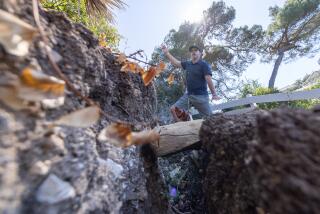No active quake fault is under Hollywood projects, state official says
- Share via
REPORTING FROM SACRAMENTO — A state official Thursday agreed with developers who contend an active earthquake fault does not exist underneath several prominent Hollywood projects, including the site of the proposed Millennium Hollywood skyscrapers.
Stephen Testa, executive officer of the State Mining and Geology Board, said at a public hearing at the state Capitol that there appears to be “a lot of strong evidence” that the active fault is not present as indicated by the California Geological Survey’s proposed zoning map.
“You know what you see, and there was no fault or faulting deposits in those trenches that were observed,” said Testa, who visited the site when consultants hired by developers conducted a search for the fault.
Testa’s conclusion, as well as more than 200 pages of public comments, now goes to state geologist John Parrish, who as head of the state geological survey has final say over how the map is drawn.
Parrish, however, said that the developers’ consultant has not provided the technical data backing its conclusions. He said he was eager to review the data but will not make any decisions about changing the map until he receives it.
The state geological survey was not given ample access to the developers’ trenches to make its own determination about whether an active fault existed there, Parrish said.
“Contrary to a lot of things being said, we were not in the trenches. We were allowed into the first trench a couple of times,” Parrish said, adding that his scientists were not allowed to make sketches or take photographs and were not allowed to engage in give-and-take with the consultants.
Parrish said he is required by state law to issue a final version of the regulatory Hollywood fault map 90 days after the end of public comment period, which concluded Thursday.
The State Mining and Geology Board voted to approve Testa’s recommendation that the state geological survey consider the developers’ final data findings when they are submitted. Testa said he thought the final data will show the absence of active faults.
The state’s map has been the subject of much debate because it placed the Hollywood fault zone through the iconic Capitol Records tower and Millennium project, where a developer plans to build Hollywood’s tallest skyscrapers, at 39 and 35 stories tall. The map estimates the fault also goes under other developments.
Michael Reader, the geotechnical consultant hired by Millennium and a number of other Hollywood developers, said his firm was unable to find any active faults after comprehensive studies under four properties near Argyle Avenue and Yucca Street.
His firm, Group Delta, did find minor faults under two properties across the street from the Millennium site and a proposed apartment complex at the former KFWB radio studio, Reader said. But tests showed that these faults last shook so long ago that they are considered inactive, he said. California law defines faults that ruptured within the last 11,000 years as active.
Reader’s firm dug four trenches, which were 120 to 200 feet long and as deep as 35 feet, and took dozens of sonar and soil samples up to 60 feet deep. The work so far has cost the developers more than $1 million.
A full report of the Millennium investigation is being finalized and will be submitted to city officials this month, Philip Aarons of Millennium Partners said in a statement this week.
When finalized, the state’s map of the Hollywood fault will require anyone seeking to build in a zone roughly 500 feet from the estimated path of the fault to do a detailed earthquake fault study. The study is done to ensure a structure is not constructed on top of the fault.
The final say over whether a structure can be built lies with Los Angeles’ Department of Building and Safety, which must determine whether a developer has done sufficient underground study and proved a structure can be built safely away from any active faults.
Twitter: @LATDoug
Times staff writers Rosanna Xia and Rong-Gong Lin II contributed to this report.
More to Read
Sign up for Essential California
The most important California stories and recommendations in your inbox every morning.
You may occasionally receive promotional content from the Los Angeles Times.











